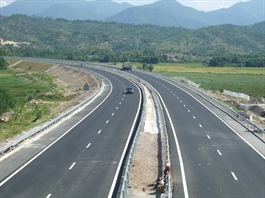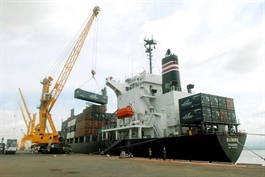False claim of losses by FDI companies
False claim of losses by FDI companies
Foreign Direct Investment (FDI) companies have remained strong throughout the pandemic, and have even continued to expand their businesses. However, more than half of these companies have reported huge losses, which is causing much strain for government officials.
Illustrative photo. |
The 2020 business report on the performance of FDI companies released by the Ministry of Finance, and the Ministry of Planning and Investment, shows that FDI companies have all kept their capital safe, increased their equity, and even expanded their businesses. Therefore, the reported losses by FDI companies is false, when instead they have made many gains.
Increase in revenue
Based on the 2020 financial statement of 25,171 companies, which make up 90.6% of governing FDI companies and 78.7% of all FDI companies, the Ministry of Finance said that FDI companies earned a total revenue of more than VND 7.5 mn bn in 2020, an increase of VND 340,000 bn, and up by 4.8% over 2019. The equity was almost VND 3.5 mn bn, rising by nearly VND 390,000 bn, and up by 12.4% over 2019, with the owners' investment capital being more than VND 2.3 mn bn.
In 2020, 10,125 companies reported profits, which means that 40.2% of the companies turned in their financial statements. Gross profits shown were over VND 406,000 bn, growing by VND 37,000 bn, or up 10% over 2019. Five sectors that made the greatest contribution towards gross profits were industries for electronic components, computers, computer peripheral devices and optical devices; food processing, brewery and beverages; chemicals, plastic and cosmetics; assembly industry of automobile, motorcycles and other engines; and the leather and footwear industry.
On the other hand, reports on losses in 2020 came from 14,108 companies, making up 56% of the companies that submitted their financial statements, with losses upto VND 151,000 bn. The total assets of the companies showing losses were over VND 2.4 mn bn, up 22% compared with the total assets of the companies with losses in 2019. The revenues of the companies with losses were nearly VND 1.1 mn bn, increasing 27% over 2019.
By the end of 2020, 16,164 companies had reported accumulated losses in their financial statements, accounting for 64% of the companies, with total accumulated losses of more than VND 620,000 bn, or 44% of their equity. The total assets of the companies with accumulated losses were VND 2.9 mn bn, up by 8.1%, and the revenue was over VND 1.3 mn bn, increasing by 5.2%. Of the 4,250 companies that lost all their assets, 466 companies still added investment capital worth more than VND 5,400 bn.
The domestic revenue of FDI companies was VND 206,000 bn in 2020, dropping by more than VND 6,000 bn over 2019. This was the first time during the 2016 to 2020 period that a year-on-year fall had been recorded in FDI payments to the state budget. The Ministry of Finance says that revenues and gross profits have increased every year, but there has been no positive sign of companies' reporting on losses, accumulated losses, and losses of original investments. This actually indicates some sign of transfer and tax evasion, causing losses to the tax revenue and adversely affecting the investment environment and fair competition.
Proposed criteria
The Ministry of Planning and Investment says that one of the hindrances in attracting and managing Foreign Direct Investment in the last few years has been the inefficient use of land at many investment projects and the small scale of projects. The technology used at FDI companies is not considered remarkably superior to domestic businesses. The number of projects applying advanced and modern technology from Europe and the US is only 5%, mainly medium technology, of which 30% to 40% originate from China. Low and outdated technology comprises 15%, which has led to risks and challenges for greater energy consumption and depletion of resources.
In particular, technology transfer in Vietnam has been done mainly through capital contribution and procurement of machinery and equipment. This kind of technology transfer only takes place between parent companies overseas and their subsidiaries in Vietnam, rather than making any significant change in expertise, capacity, innovation and technology creation. Upto 85% of FDI companies in Vietnam are wholly foreign-owned companies. This has severely hampered FDI companies' efforts to transfer and spread technology.
Currently, the localization rate in Vietnam is 20% to 25% on an average. The rate is 40% to 45% in the textile, leather and footwear sector; 30% to 35% in household electronics; 30% to 40% in synchronous equipment; 7% to 10% in car assembly; 55% in truck assembly; 40% in bus and specialized car assembly; 15% in information technology and electronics industry; and 5% to 10% in the high-tech industry.
The report by the Ministry of Planning and Investment says it has proposed seven criteria for attracting Foreign Direct Investment, having learnt from experience over the last thirty years. The criteria for carefully selecting Foreign Direct Investment includes investment rates; labor; technology; technology transfer; connectivity; pivotal effects; environment; national defense and security.
In this selection process, environmental criterion plays a key role. The Ministry of Planning and Investment says that this is an important criterion for achieving the goal of sustainable development, attracting further foreign investments, and conserving energy sources.
Over the last few years, FDI projects in heavy industries, such as cement, steel, coal powered energy, and petrochemical refining, have caused huge emissions, that have negatively affected the environment. In order to comply with this criterion, the Ministry of Planning and Investment says it is necessary to abide by Article 44 of the 2020 Investment Law, and Decree 31/2021/ND-CP, which has detailed guidelines on enforcement of the Investment Law.
These two documents prohibit expanding and extending operations for FDI projects with outdated technology, potentially causing environmental pollution and resource depletion. When their operating term expires, FDI projects that wish to extend their projects must meet the relevant technology and environmental criterion.




















